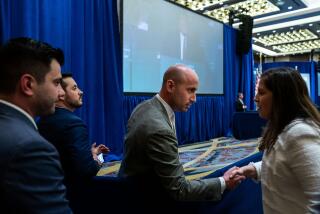Risky Corporate Crusades in South Africa
- Share via
The social activism of U.S. companies in South Africa has expanded dramatically during the past several years, mostly in response to requirements of the Sullivan Principles. This independently monitored code of conduct was voluntarily initiated in 1977 by U.S. firms that felt a need to demonstrate that they were not collaborating with the apartheid system.
In an environment in which cheap black labor has underwritten easy profits for shareholders and colonial life styles for management, the counterweight of the Sullivan Principles is essential. During the past 10 years the code’s increasingly strict application has ensured that there is no “business as usual” for Sullivan signatories. In fact, many U.S. companies now adhere to much higher standards of corporate responsibility and affirmative action in South Africa than they do at home.
However, Sullivan-sponsored improvements in the workplace have not been matched by similar strides in society as a whole. As this gap has become more apparent, and as U.S. public pressure mounts, these companies have allowed themselves to be drawn into an appealing but defective syllogism: Because adherence to the Sullivan Principles is an alternative to compliance with apartheid--and because most American companies are Sullivan signatories--these firms should be considered agents of political change.
In fact, as the events of the past few weeks have demonstrated, the political evolution of South Africa is going to be shaped by forces far more powerful than the activities of corporate public-affairs departments. The declaration of a nationwide state of emergency followed by the statutory suspension of most civil rights indicates that Pretoria has reached the point of desperation. But desperation should not be confused with a willingness to give up. It is much more likely that South Africa is now on the verge of an ugly and repressive interregnum during which many of the assumptions that have been made about the role and status of American companies will be proved invalid.
The expectations about what can be accomplished by 190 Sullivan signatory companies with 65,000 employees are remarkable indeed. Do those who champion divestiture seriously propose to hold the managers of a tiny segment of the South African economy accountable for the behavior of an Afrikaner elite that has ruled for nearly 40 years? And what leverage would be exerted if U.S. firms do pull out?
Companies cannot “withdraw” an oil refinery or an automobile assembly plant, but they can leave them behind--and probably on terms set by those who remain. Does a 100-year, 3% debenture payable in non-convertible rand sound like reasonable compensation for such investments? Thus the so-called “disinvestment” campaign could be turned into an asset-transfer program that would provide an enormous windfall for Pretoria & Co.
Another questionable premise likely to be tested soon is that of American immunity. In a May 2 letter to the chief executives of signatory companies, the Rev. Leon Sullivan, the author of the principles, urged that companies engage in acts of “corporate civil disobedience” aimed at bringing down the apartheid system. To a surprising extent, the companies appear to be following his advice. This spring, General Motors Corp. announced that it would pay the legal expenses of any employee arrested while challenging the segregation of Eastern Cape beaches. The manager of a large engineering and construction company recently confided that several employees had been detained briefly for questioning by police in connection with a Sullivan program involving anti-apartheid activists. This information was conveyed with a certain sense of pride--reflecting the fact that in the insular world of Sullivan program management, getting arrested may be regarded as a form of achievement.
Challenging the system, crusading for justice, shaping a new South Africa--it’s all heady stuff, and satisfying, too, as long as everyone understands that the employees of U.S. companies always are entitled to safe conduct if things get out of hand. But what happens when arrests are made in the middle of the night, when police will not confirm who is being held, when detention and disappearance become interchangeable?
In South Africa today, nonviolence is becoming disreputable on both sides of the struggle. The police are not alone in their determination to prevail by any means. The African National Congress and its allies have made clear their belief in the adage that freedom comes only from the barrel of a gun. Companies attempting to coordinate their Sullivan programs with black community leaders have begun to encounter demands for “contributions to the cause”--sometimes backed by a degree of pressure tantamount to extortion. The expectations raised by Sullivan rhetoric now must be dealt with in an environment in which partisan support has become the order of the day.
Would-be corporate crusaders need to take a hard look at the risks to which they are exposing their South African employees, and the liabilities that may in turn be assumed by their directors and shareholders. Injury and loss of life are everyday occurences in a contest that is growing increasingly bitter.
On balance, the record of U.S. firms in South Africa is one that we can be proud of. The Sullivan Principles deserve much of the credit for their performance. However, if companies are going to continue to exert a positive influence, they must recognize their limits and resist the politicization of the program that has served them so well.
More to Read
Inside the business of entertainment
The Wide Shot brings you news, analysis and insights on everything from streaming wars to production — and what it all means for the future.
You may occasionally receive promotional content from the Los Angeles Times.










